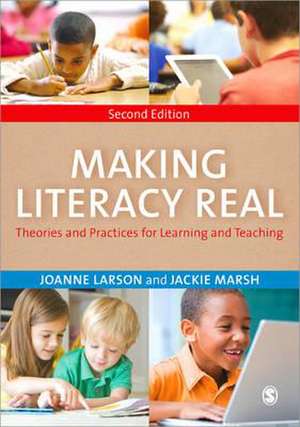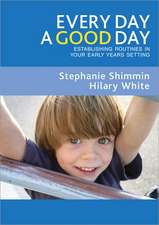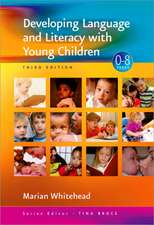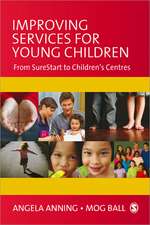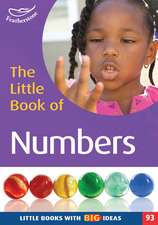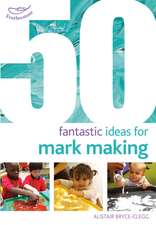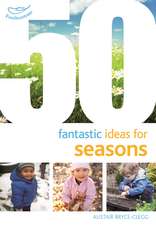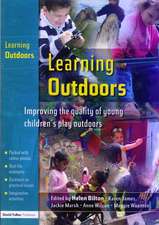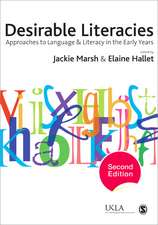Making Literacy Real: Theories and Practices for Learning and Teaching
Autor Joanne Larson, Jackie Marshen Limba Engleză Paperback – 21 dec 2014
Each chapter uses a real life case study to explore the application of theory in practice, followed by a detailed discussion of the case study material by a leading name in the field, including contributions from Barbara Comber, Michele Knobel, Colin Lankshear, Gunther Kress, Brian Street, Kevin Leander and Patricia Enciso.
The text also offers reflections on theoretical foundations for research, exploring literacy as a practice grounded in social, cultural, historical and political contexts and in relationships of power.
This second edition includes:
- New chapters covering digital literacy, space and play, and multimodality
- Examples and contributions from a range of international contexts, including US, UK, Canada, Australia and South Africa
- Further reading links.
Preț: 385.91 lei
Nou
Puncte Express: 579
Preț estimativ în valută:
73.84€ • 80.46$ • 62.22£
73.84€ • 80.46$ • 62.22£
Carte tipărită la comandă
Livrare economică 23 aprilie-07 mai
Preluare comenzi: 021 569.72.76
Specificații
ISBN-13: 9781446295397
ISBN-10: 1446295397
Pagini: 216
Dimensiuni: 170 x 242 x 11 mm
Greutate: 0.36 kg
Ediția:Second Edition
Editura: SAGE Publications
Colecția Sage Publications Ltd
Locul publicării:London, United Kingdom
ISBN-10: 1446295397
Pagini: 216
Dimensiuni: 170 x 242 x 11 mm
Greutate: 0.36 kg
Ediția:Second Edition
Editura: SAGE Publications
Colecția Sage Publications Ltd
Locul publicării:London, United Kingdom
Recenzii
Larson and Marsh reassemble a polyphonic choir to interpret literacies as critical social practices - with new voices, adding powerful contrapuntal harmonies to contest the logic, theory, and practice of the National Curriculum and Race to the Top. Sing out!
When it was first published, this groundbreaking book brought key contemporary theories of literacy together in a coherent and accessible form. Making Literacy Real quickly established itself as a key resource for educators, students and researchers working in a rapidly changing field. This updated edition incorporates the latest research around play, space and multimodality ensuring that it remains essential reading for those of us interested in literacy theory and literacy education.
When it was first published this groundbreaking book quickly established itself as a key resource for educators, students and researchers working in a rapidly changing field. This updated edition incorporates the latest research around play, space and multimodality, ensuring that it remains essential reading for those of us interested in literacy theory and literacy education.
This is one of very few books that considers the world of possibilities within literacy pedagogy and challenges the dominant techno-rational approach that reduces literacy to skills teaching. The book is grounded in robust theoretical models that challenge the reader to critically reflect on their practice. The vignettes are extremely helpful in contextualising what the authors say. A must read for all aspiring and current literacy teachers.
This new edition of Joanne Larson and Jackie Marsh’s important book Making Literacy Real is theoretically illuminating and insightfully grounded in useful cases and effective practices. It is the foundation anyone interested in Literacy Studies needs to start with.
Engaging and invitational, this second edition of Making Literacy Real skilfully illuminates the inseparability of theory and practice. It makes accessible a comprehensive range of theoretical frameworks, including new sections on Space and Play, and Multimodalities and Artifactual Literacy and describes their application and realisation in the classroom through authentic examples. A ‘must have’ text for all contemporary literacy professionals.
In this wonderful new edition of Making Literacy Real, Larson and Marsh present vivid portrayals of literacy in a variety of classrooms. They invite readers to consider key theories, which inform literacy in the 21st century, and make their presence visible in transformative teaching and learning. Making Literacy Real (2nd edition) will be an inspiration to teachers, teacher-researchers, and all who care about the transformative potential and power of education. (Mariana Souto-Manning, Teachers College, Columbia University)
Alongside learners and teachers, Larson and Marsh’s wonderful new edition of Making Literacy Real considers what might be possible in today’s classrooms and schools. In practical and theoretically sophisticated ways, Making Literacy Real invites teachers, teacher-researchers, and educators to rethink literacy and to witness compelling classroom practices in empowering and hopeful ways. In a time when literacy is being defined in reductionist terms, Making Literacy Real will be an inspiration to teachers, teacher-researchers, and all who care about the expansive, transformative potential and power of education. (Mariana Souto-Manning, Teachers College, Columbia University)
Starting with the understanding that literacy is social, cultural, historical, and political, Larson and Marsh explain literacy theories and vividly describe classroom contexts that bring those theories to life. In accessible, practical, empowering, and theoretically-sophisticated ways, Making Literacy Real makes visible various ways in which teachers may engage in theoretically-rich teaching in powerful and transformative ways, engaging learners of all ages. In a time when literacy is being defined in reductionist terms, Making Literacy Real will be an inspiration to teachers, teacher-researchers, and all who care about the transformative potential and power of education. (Mariana Souto-Manning, Teachers College, Columbia University)
Making Literacy Real is a theoretically powerful and practical resource for all who believe that literacy teaching and learning must take into account the social and cultural worlds of children and youth. Beyond sharing vivid examples from a variety of classrooms, Larson and Marsh shed light onto how teachers can engage in transformative literacy teaching. In a time when literacy is being reduced to skills, this is a very timely resource for all who want to teach in hopeful and transformative ways. (Mariana Souto-Manning, Teachers College, Columbia University)
Larson and Marsh masterfully make visible the links between theories informing literacy and classroom practice. They not only explain literacy theory, but vividly portray ways in which these theories have come to life in a variety of classrooms. This book beautifully shows how theory and practice are inseparable, moving away from ideas of applying or translating theory. Larson and Marsh show readers how classroom practices are theorized as practices are transformed over time. In a time when literacy is being reduced to skills and teachers are being told what and how to teach, this is a must-read; truly a timely resource for all who want to teach in hopeful and transformative ways. (Mariana Souto-Manning, Teachers College, Columbia University)
Moving away from deficit perspectives that have historically informed the field of literacy, Larson and Marsh make visible how, across a variety of classroom settings and in theoretically rich ways, teachers engage in action, reflect, and transform their teaching. While recognizing that many theories inform literacy, Making Literacy Real focuses on six theoretical traditions shaping literacy, offering insights onto the ways that teachers can plan, teach, and organize their classrooms so that their literacy practice will be theoretically sound and their curriculum will build on the strengths and expertise of their students. During a time when mandated and commercial curricula abound, Making Literacy Real will prove an invaluable resource. (Mariana Souto-Manning, Teachers College, Columbia University)
Making Literacy Real invites readers to move beyond traditional approaches to literacy education which emphasize one-size-fits-all, normalized learning trajectories. Larson and Marsh vividly portray classrooms that have rejected reductionist and constraining models of literacy teaching and, instead, embraced ways of teaching that recognize and build on the many strategies and resources students bring to classrooms. Moving beyond the false theory-practice dichotomy, this new edition, which includes 21st century literacies, is a gem. In a time when literacy is being defined in reductionist terms, Making Literacy Real will be an inspiration to teachers, teacher-researchers, and all who care about the transformative potential and power of education. (Mariana Souto-Manning, Teachers College, Columbia University)
Making Literacy Real invites readers to move beyond traditional approaches to literacy education which emphasize one-size-fits-all, normalized learning trajectories. Larson and Marsh vividly portray classrooms that have rejected reductionist and constraining models of literacy teaching and, instead, embraced ways of teaching which recognize and build on the many strategies and resources students bring to classrooms. Moving beyond the false theory-practice dichotomy, this new edition, which includes 21st century literacies, is a gem. In a time when literacy is being defined in reductionist terms, Making Literacy Real will be an inspiration to teachers, teacher-researchers, and all who care about the transformative potential and power of education.
When it was first published, this groundbreaking book brought key contemporary theories of literacy together in a coherent and accessible form. Making Literacy Real quickly established itself as a key resource for educators, students and researchers working in a rapidly changing field. This updated edition incorporates the latest research around play, space and multimodality ensuring that it remains essential reading for those of us interested in literacy theory and literacy education.
When it was first published this groundbreaking book quickly established itself as a key resource for educators, students and researchers working in a rapidly changing field. This updated edition incorporates the latest research around play, space and multimodality, ensuring that it remains essential reading for those of us interested in literacy theory and literacy education.
This is one of very few books that considers the world of possibilities within literacy pedagogy and challenges the dominant techno-rational approach that reduces literacy to skills teaching. The book is grounded in robust theoretical models that challenge the reader to critically reflect on their practice. The vignettes are extremely helpful in contextualising what the authors say. A must read for all aspiring and current literacy teachers.
This new edition of Joanne Larson and Jackie Marsh’s important book Making Literacy Real is theoretically illuminating and insightfully grounded in useful cases and effective practices. It is the foundation anyone interested in Literacy Studies needs to start with.
Engaging and invitational, this second edition of Making Literacy Real skilfully illuminates the inseparability of theory and practice. It makes accessible a comprehensive range of theoretical frameworks, including new sections on Space and Play, and Multimodalities and Artifactual Literacy and describes their application and realisation in the classroom through authentic examples. A ‘must have’ text for all contemporary literacy professionals.
In this wonderful new edition of Making Literacy Real, Larson and Marsh present vivid portrayals of literacy in a variety of classrooms. They invite readers to consider key theories, which inform literacy in the 21st century, and make their presence visible in transformative teaching and learning. Making Literacy Real (2nd edition) will be an inspiration to teachers, teacher-researchers, and all who care about the transformative potential and power of education. (Mariana Souto-Manning, Teachers College, Columbia University)
Alongside learners and teachers, Larson and Marsh’s wonderful new edition of Making Literacy Real considers what might be possible in today’s classrooms and schools. In practical and theoretically sophisticated ways, Making Literacy Real invites teachers, teacher-researchers, and educators to rethink literacy and to witness compelling classroom practices in empowering and hopeful ways. In a time when literacy is being defined in reductionist terms, Making Literacy Real will be an inspiration to teachers, teacher-researchers, and all who care about the expansive, transformative potential and power of education. (Mariana Souto-Manning, Teachers College, Columbia University)
Starting with the understanding that literacy is social, cultural, historical, and political, Larson and Marsh explain literacy theories and vividly describe classroom contexts that bring those theories to life. In accessible, practical, empowering, and theoretically-sophisticated ways, Making Literacy Real makes visible various ways in which teachers may engage in theoretically-rich teaching in powerful and transformative ways, engaging learners of all ages. In a time when literacy is being defined in reductionist terms, Making Literacy Real will be an inspiration to teachers, teacher-researchers, and all who care about the transformative potential and power of education. (Mariana Souto-Manning, Teachers College, Columbia University)
Making Literacy Real is a theoretically powerful and practical resource for all who believe that literacy teaching and learning must take into account the social and cultural worlds of children and youth. Beyond sharing vivid examples from a variety of classrooms, Larson and Marsh shed light onto how teachers can engage in transformative literacy teaching. In a time when literacy is being reduced to skills, this is a very timely resource for all who want to teach in hopeful and transformative ways. (Mariana Souto-Manning, Teachers College, Columbia University)
Larson and Marsh masterfully make visible the links between theories informing literacy and classroom practice. They not only explain literacy theory, but vividly portray ways in which these theories have come to life in a variety of classrooms. This book beautifully shows how theory and practice are inseparable, moving away from ideas of applying or translating theory. Larson and Marsh show readers how classroom practices are theorized as practices are transformed over time. In a time when literacy is being reduced to skills and teachers are being told what and how to teach, this is a must-read; truly a timely resource for all who want to teach in hopeful and transformative ways. (Mariana Souto-Manning, Teachers College, Columbia University)
Moving away from deficit perspectives that have historically informed the field of literacy, Larson and Marsh make visible how, across a variety of classroom settings and in theoretically rich ways, teachers engage in action, reflect, and transform their teaching. While recognizing that many theories inform literacy, Making Literacy Real focuses on six theoretical traditions shaping literacy, offering insights onto the ways that teachers can plan, teach, and organize their classrooms so that their literacy practice will be theoretically sound and their curriculum will build on the strengths and expertise of their students. During a time when mandated and commercial curricula abound, Making Literacy Real will prove an invaluable resource. (Mariana Souto-Manning, Teachers College, Columbia University)
Making Literacy Real invites readers to move beyond traditional approaches to literacy education which emphasize one-size-fits-all, normalized learning trajectories. Larson and Marsh vividly portray classrooms that have rejected reductionist and constraining models of literacy teaching and, instead, embraced ways of teaching that recognize and build on the many strategies and resources students bring to classrooms. Moving beyond the false theory-practice dichotomy, this new edition, which includes 21st century literacies, is a gem. In a time when literacy is being defined in reductionist terms, Making Literacy Real will be an inspiration to teachers, teacher-researchers, and all who care about the transformative potential and power of education. (Mariana Souto-Manning, Teachers College, Columbia University)
Making Literacy Real invites readers to move beyond traditional approaches to literacy education which emphasize one-size-fits-all, normalized learning trajectories. Larson and Marsh vividly portray classrooms that have rejected reductionist and constraining models of literacy teaching and, instead, embraced ways of teaching which recognize and build on the many strategies and resources students bring to classrooms. Moving beyond the false theory-practice dichotomy, this new edition, which includes 21st century literacies, is a gem. In a time when literacy is being defined in reductionist terms, Making Literacy Real will be an inspiration to teachers, teacher-researchers, and all who care about the transformative potential and power of education.
Cuprins
Foundational Perspectives
New Literacy Studies
Critical Literacy
Literacy and Digital Technologies
Multimodality and Artifactual Literacies
Space, Play and Literacy
Reframing Sociocultural Theory: Identity, Agency and Power
Bringing the Frameworks Together: Implications for research, policy and practice
New Literacy Studies
Critical Literacy
Literacy and Digital Technologies
Multimodality and Artifactual Literacies
Space, Play and Literacy
Reframing Sociocultural Theory: Identity, Agency and Power
Bringing the Frameworks Together: Implications for research, policy and practice
Notă biografică
Descriere
Updated with new chapters covering digital literacy, space and play, and multimodality, this new edition offers an overview of the major fields in literacy studies.
